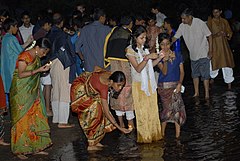Aadi Perukku
| Aadi Perukku | |
|---|---|

Aadi Monsoon Festival
|
|
| Also called | Aadiperukku, Translation: Aadi Monsoon Festival, Pathinettam Perukku |
| Observed by | Hindus |
| Type | Religious |
| Observances | Prayers, Mulaipari, Religious rituals (see puja, prashad) |
| Date | Decided by the Hindu Tamil calendar |
| 2016 date | August 2 |
| 2017 date | August 2 |
| Frequency | annual |
Adiperukku commonly known as the Aadi monsoon festival and also written as Aadiperukku is a Hindu Tamil festival celebrated on the 18th day of the Tamil month of Adi (mid-July to mid-August). The festival pays tribute to water's life-sustaining properties. For the blessing of mankind with peace, prosperity and happiness, nature worship in the form of Amman deities are organized to shower Nature’s bountiful grace on human beings.
The goddess, as Pachai Amman, is a manifestation of divine design, to establish peace and harmony in the world. Pachai amman or Kanni amman appeared in many local spots which exhibited holy centers by inherent energy presence and influence of over that localities. In the manifestation of Pachai Amman in Thirumullaivaayal, the amman deity was successful in establishing peace and prosperity in this world. She is called the goddess of marriage as she blesses those awaiting marriage to enter into wedlock. There is a tall statue of Ayyanar housed in Pachai amman temple of Thirumullaivaayal which is an added attraction. A tank near the temple is said to possess medicinal properties. Devotees surge to have a rendezvous with the goddess on Tuesdays, Fridays and Sundays and more specially on Aadi month.
Adiperukku is a unique South Indian and specially a Tamil festival celebrated on the 18th day of the Tamil month of Adi (mid July). The festival coincides with the annual freshes of the rivers and to pay tribute to water's life-sustaining properties. It is celebrated near river basins, water tanks, lakes and wells etc. of Tamil Nadu when the water level in the rises significantly heralding the onset of Monsoon
In India the rivers Ganges and Yamuna, Cauvery and Godavari are considered sacred. Just like the earth gives us food, water is considered as a sacred necessity to meet the needs of individuals. People began to worship water in the form of wells, tanks and rivers. It is common among people to throw fruits, saffron cloths, etc., when the rivers and lakes are in spate purely based on the belief that these rivers are the species of female deities. Similarly every temple has sacred wells and tanks, and water in these resources are considered pure. There are cultural developments of the society that highlight many variations on the theme of primeval water which shows that water culture and civilization represent human interest with sacredness.
...
Wikipedia
